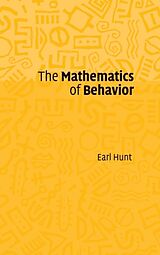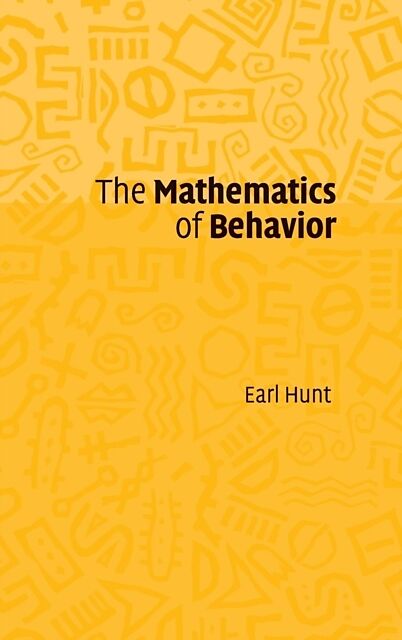The Mathematics of Behavior
Einband:
Fester Einband
EAN:
9780521850124
Untertitel:
Englisch
Autor:
Earl. Hunt
Herausgeber:
Cambridge University Press
Anzahl Seiten:
358
Erscheinungsdatum:
30.10.2017
ISBN:
0521850126
Informationen zum Autor Earl Hunt is Professor Emeritus of Psychology at the University of Washington in Seattle. He has written many articles and chapters in contributed volumes and was the past editor of Cognitive Psychology and Journal of Experimental Psychology. His books include Concept Learning: An Information Processing Problem (Wiley), Experiments in Induction (Academic Press), Artificial Intelligence (Academic Press), and Will We Be Smart Enough? (Sage Foundation) which won the William James Prize from the American Psychological Association in 1996. His most recent book is Thoughts on Thought (Erlbaum, 2002). Klappentext This book is about using mathematics to think about how humans (and other animals) behave. Zusammenfassung This book illustrates how mathematics can be used to understand human and animal behavior! using examples in psychology! sociology! economics! ecology! and even marriage counseling. It is intended as an introduction to the use of mathematical thinking in the social and behavioral sciences. Inhaltsverzeichnis 1. Introduction; 2. Applying probability theory to problems in sociology and psychology; 3. From physics to perception; 4. When systems evolve over time; 5. Non-Linear and chaotic systems; 6. Defining rationality - personal and group decision making; 7. How to evaluate evidence; 8. Multidimensional scaling surveying the geography of the mind; 9. The mathematical models behind psychological testing; 10. How to know you asked a good question; 11. The construction of complexity: how simple rules make the complex organizations; 12. Connectionism: computation connects mind and brain; 13. L'Envoi; References; Index.
Autorentext
Earl Hunt is Professor Emeritus of Psychology at the University of Washington in Seattle. He has written many articles and chapters in contributed volumes and was the past editor of Cognitive Psychology and Journal of Experimental Psychology. His books include Concept Learning: An Information Processing Problem (Wiley), Experiments in Induction (Academic Press), Artificial Intelligence (Academic Press), and Will We Be Smart Enough? (Sage Foundation) which won the William James Prize from the American Psychological Association in 1996. His most recent book is Thoughts on Thought (Erlbaum, 2002).
Klappentext
This book is about using mathematics to think about how humans (and other animals) behave.
Zusammenfassung
This book illustrates how mathematics can be used to understand human and animal behavior, using examples in psychology, sociology, economics, ecology, and even marriage counseling. It is intended as an introduction to the use of mathematical thinking in the social and behavioral sciences.
Inhalt
1. Introduction; 2. Applying probability theory to problems in sociology and psychology; 3. From physics to perception; 4. When systems evolve over time; 5. Non-Linear and chaotic systems; 6. Defining rationality - personal and group decision making; 7. How to evaluate evidence; 8. Multidimensional scaling surveying the geography of the mind; 9. The mathematical models behind psychological testing; 10. How to know you asked a good question; 11. The construction of complexity: how simple rules make the complex organizations; 12. Connectionism: computation connects mind and brain; 13. L'Envoi; References; Index.

Leider konnten wir für diesen Artikel keine Preise ermitteln ...
billigbuch.ch sucht jetzt für Sie die besten Angebote ...
Die aktuellen Verkaufspreise von 6 Onlineshops werden in Realtime abgefragt.
Sie können das gewünschte Produkt anschliessend direkt beim Anbieter Ihrer Wahl bestellen.
Loading...
Die aktuellen Verkaufspreise von 6 Onlineshops werden in Realtime abgefragt.
Sie können das gewünschte Produkt anschliessend direkt beim Anbieter Ihrer Wahl bestellen.
| # | Onlineshop | Preis CHF | Versand CHF | Total CHF | ||
|---|---|---|---|---|---|---|
| 1 | Seller | 0.00 | 0.00 | 0.00 |
